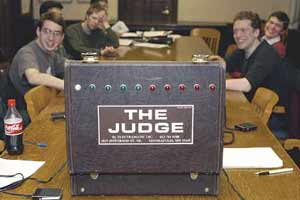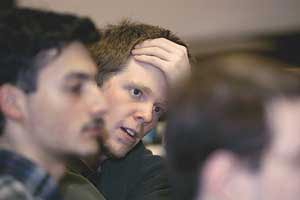College Bowl club gears up for its own month of ‘madness’ with tournaments
By Josh SchonwaldNews Office
 College Bowl club members who will play in the April tournaments practice against the clock in Ida Noyes Hall. |
April is national championship season for quizzers, and the University’s team, after two months of regional qualifying rounds, has advanced to nationals in not one, but three quiz tournaments. Next month, the team will head to the University of California, Los Angeles campus on Friday, April 4, for the National Academic Quiz Tournament finals, then to Atlanta for the Academic Competition Federation finals, and finally, the team will head to Philadelphia for the granddaddy of them all–the College Bowl, Inc. tournament, which begins Friday, April 25.
Because all three national tournaments occur in April, the quizzers’ intensity ratchets up significantly after Spring Break, said Ed Cohn, a third-year player and a History Ph.D. student.
Unlike the more informal come-if-you-can fall and winter practices, players selected by team president Peter Onyisi to represent the University in nationals will, beginning after Spring Break, head to a separate room on the second floor of Ida Noyes Hall, away from the non-tournament players. There, they will spend roughly three hours on Tuesday and Thursday nights, playing tournament practice rounds, said Cohn. During these practices, players will answer questions from previous tournaments or tournaments the Chicago team did not attend.
The students, who devote several hours each week, year-round to honing their quiz gaming skills–and who travel thousands of miles to attend intercollegiate quiz tournaments each quarter–do so for a variety of reasons.
Onyisi, a fourth-year in the College, who said his specialties are the history of Ancient Near East and 20th-century architecture, developed a fondness for quiz games as a youth in Nigeria.
Upon arrival at Chicago, he joined the club, had fun and has been hooked ever since.
 |
Cohn, whose academic focus is Soviet history, caught the quiz bug as an undergraduate at Swarthmore College, where his team won a national championship in the National Academic Quiz Tournament. “It was fun,” said Cohn, who favors history and current events questions and who prefers the Academic Competition Federation and National Academic Quiz Tournament formats.
Indeed, part of the reason the College Bowl team has such a busy, year-round calendar is because three competing quiz tournaments exist; each of which, Cohn said, has its own character. College Bowl, which originated in the 1950s as an offshoot of the television game show sponsored by General Electric, is unique and is the best known, oldest and arguably most prestigious, but some serious quizzers dislike its occasional trick questions.
“There’s more danger in answering a College Bowl question,” explained Onyisi. “Unlike the others, questions can have a twist.”
The other, newer formats are the Academic Competition Federation, which has a reputation for straightforward and more academically focused questions, and the National Academic Quiz Tournament, which has timed rounds, and more current events and pop culture questions than the others.
But all quiz formats, team members agree, have some key similarities: there are four or five team members, and games are generally structured to reward depth of knowledge. “A team that has only superficial knowledge is not going to do well,” said Onyisi.
The games are structured so questions get progressively more difficult. In each of the variations of the game, players compete to answer toss-up questions, which begin with a difficult clue and become progressively easier. Each toss-up earns a team ten points and the chance for the team to answer a bonus question, which is worth 30 points.
Quiz tournaments are one of the few intercollegiate competitions that pit undergraduate students against graduate students. Though teams with graduate students traditionally prevail, undergraduates are not necessarily outclassed by their elders, said Onyisi.
“I think it’s easier for younger people to be ‘generalists,’” said Onyisi. “I’m a Physics concentrator, for instance, and I may know more now about that particular field, but I haven’t improved much at answering physics questions since my first year. There’s a point beyond which more in-depth knowledge doesn’t help.”
As an intercollegiate competition with thousands of players nationally, College Bowl can become, for some, hotly competitive. “Some players will read encyclopedias for facts or memorize all the titles of Henrik Ibsen plays to become better at the game,” said Cohn. But thankfully, Cohn said, most students at Chicago treat the game differently. “I don’t think people here are learning for the sake of quiz bowl.”
Onyisi agreed. He described his role in quizzing as that of a “gentleman amateur.” “I accumulate facts for my own interest,” said Onyisi. “I’m going to take a class in what I’m interested in, and if that helps me, great. But I’m not going to take a class for the game.”
The University did not win any national championships last year, but the team won the trifecta–all three national championships–in 1999, the ACF Nationals in 2000 and the NAQT Nationals in 2001. This year’s team is a promising challenger to the three-time defending University of Michigan champions, Onyisi said. He said two key players, Subash Maddipoti and Cohn, are “among the top 10 players in the country.”
For Cohn, this April will be the finale of his quizzing career. “I’ve had to cut back on my time with the team as I’ve gotten busier with grad school, and now I’m ready to retire,” he said. But Cohn won’t leave the quiz circuit entirely. “I still plan to write questions,” he said.
![[Chronicle]](/images/sidebar_header_oct06.gif)